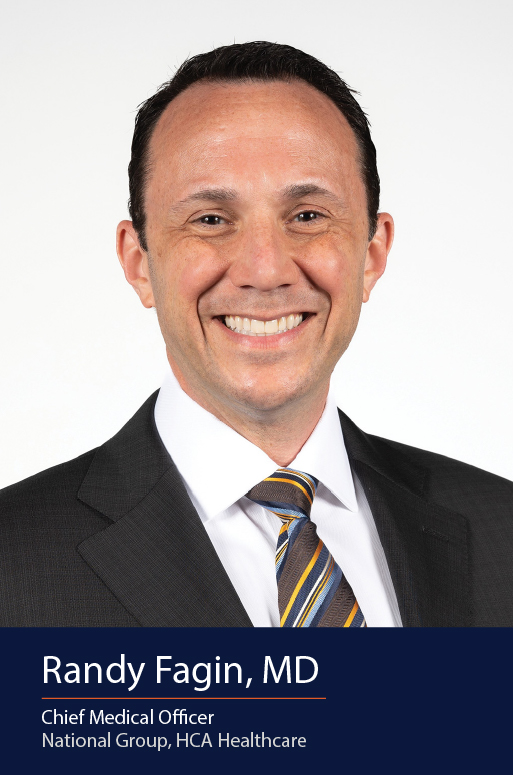Scale becomes intrinsic to providing administrative, financial and networking benefits.


When Dr. Thomas Frist, Sr., his son Dr. Thomas Frist, Jr., and Jack Carroll Massey founded HCA Healthcare in 1968, they set in motion a health system shaped from the very beginning by the physician lens. They envisioned a healthcare company with the scale, resources and clinical expertise to provide care focused on the patient.
Today, that founding philosophy continues to motivate how we work with and for our physicians. David DeBoer, MD, has practiced medicine in Nashville, Tennessee for almost 30 years. When Dr. DeBoer and his partner began to consider aligning their practice with a bigger system, he talked with Dr. Thomas F. Frist, Jr., in detail about the research he was doing.
“One of the things Dr. Frist promised was that, not only would we be able to continue updating and using our database, but we would be able to integrate our information with data from the hospital,” Dr. DeBoer says.
Dr. DeBoer began to collect data points, including length of hospital stay. He also had the resources to improve his database through an application called iCORE. The project was incorporated at other hospitals within the HCA Healthcare system, increasing the database to help patients in other communities.
Using iCORE, Dr. DeBoer and his fellow surgeons can make better decisions at the time of surgery and postoperatively, leading to measurable results. The length of stay decreased from 2 1/2 days to slightly over one day, and the rate of patients’ developing nausea after a surgical procedure dropped from almost 50% to only 5%.

Advantage of scale
Our scale, which provides access to capital, resources and a network of like-minded professionals, helps draw physicians to HCA Healthcare.
“Within the HCA Healthcare system, total joint procedures are in the tens of thousands,” Dr. DeBoer says. “Being able to access that amount of data made joining HCA Healthcare highly attractive for me. With their help, iCORE went from something we were just doing in our group to an application that improves patient care in other hospitals within the system.”
At HCA Healthcare, physicians also have access to a network of colleagues with a diverse range of expertise to draw from. Being able to share experiences, ask questions and find support from such a vast network of physicians is invaluable.
“We leverage our footprint and the data we capture to understand every aspect of our organization, and quality is an important part of that,” says Randy Fagin, MD, chief medical officer, National Group, HCA Healthcare. “Those measurements are aggregated and provided back to our physicians to enable them to make informed decisions and continue learning throughout their careers.”
Strength in numbers translates to capital assets that can then be invested into new equipment and technology to improve the level of care. For example, HCA Healthcare is currently upgrading the electronic medical record system to Expanse, a capital expenditure benefiting the entire system with added efficiency and improved patient interactions.
Geographic diversity can also play a role in attracting physicians to HCA Healthcare. From smaller, rural areas to large cities, HCA Healthcare facilities serve communities across the United States, and abroad.

Dr. Kristine Guleserian, Congenital Heart Surgery Program Director at Medical City Children’s Hospital in Dallas, Texas, has devoted her life to healing hearts and is making history while doing so. The board-certified thoracic and congenital heart surgeon became the first woman in the United States to lead a congenital heart surgery program. Dr. Guleserian was inspired to join the more than 45,000 active and affiliated physicians across HCA Healthcare when she was afforded the opportunity to build a “dream team” of surgeons, cardiologists, anesthesiologists and others who embody the qualities and skills she looks for in colleagues.
Physician-centered leadership
While quality, research, location and capital are all important, it is the overall culture that distinguishes HCA Healthcare. HCA Healthcare was founded by physicians with the intent of creating an environment where healthcare can flourish by prioritizing physician input. That included putting physicians in leadership roles, a practice that has remained an integral part of HCA Healthcare through the years.
“Physicians as leaders are embedded throughout the organization,” Dr. Fagin says. “In today’s environment it’s important that we make fiscally appropriate decisions, but at the end of the day it’s all about patient care, and when I look at HCA Healthcare, I see a system that continues to ensure [that] there are physician voices in all of those decisions.”
From operations to clinical settings, IT services, strategy and global purchasing, physicians are included in the decision-making process.

“Physicians who are leaders provide a lens through which they view the organization covering all aspects of the organization and ensuring that [that] clinical lens is a part of every decision we make as an organization,” Dr. Fagin says.
Having a voice in the decision-making process makes a difference with physicians. In HCA Healthcare’s most recent physician engagement survey, which included feedback from more than 15,000 physicians, 90% of respondents reported that HCA Healthcare was a favorable place to practice.
“What I’ve noticed, by HCA Healthcare supporting us in those leadership roles, is [that] we’re creating a culture where we work together rather than in opposition,” Dr. DeBoer says. “Our patient satisfaction surveys continue to improve; our job satisfaction surveys of physicians and nurses continue to improve; and patient care continues to improve, carrying forward our dream of delivering consistent, highly efficient healthcare.”


